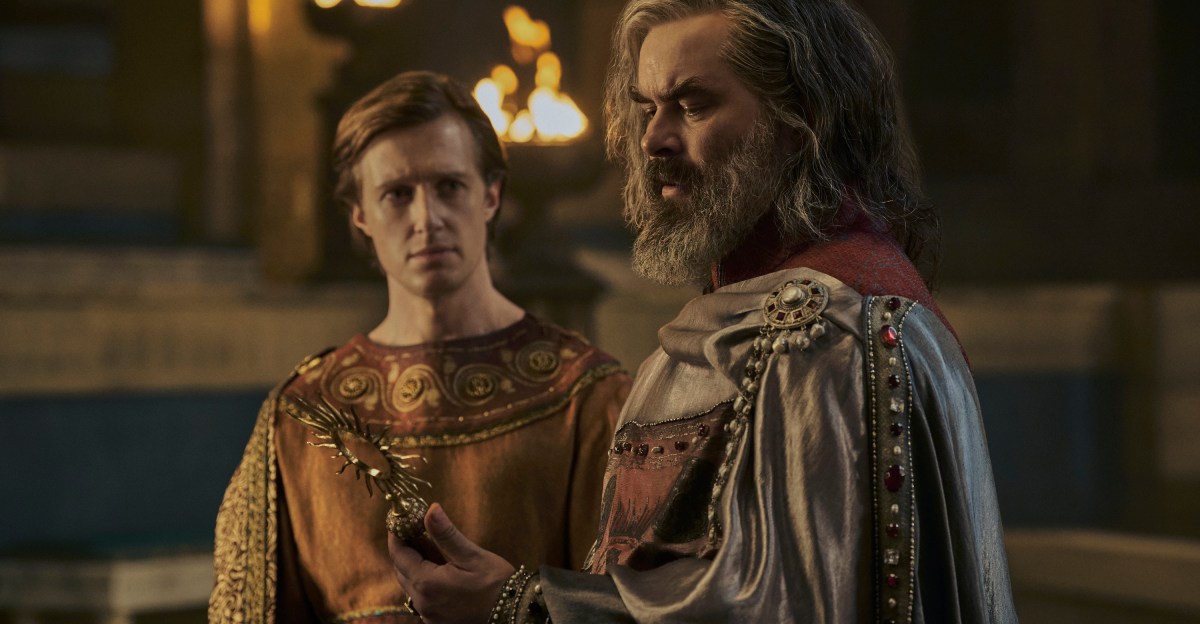Of the changes The Lord of the Rings: The Rings of Power has made from its source material, there’s none more sweeping than the scrunching of the story’s timeline. Rather than take place over three-plus millennia, Rings of Power showrunners J.D. Payne and Patrick McKay opted to condense the events of Middle-earth’s Second Age to a single human generation.
And whether it was a choice made from expediency, for accessibility, or simply for simplicity, it’s really doing a number on the island nation of Númenor.
In Tolkien’s lore, there are roughly 20 kings and queens in Númenor between Sauron’s reappearance in the Second Age and the destruction of the country, with the nation’s cultural shift from divine devotion to invading heaven itself occurring over the course of 2,800 years. But we’re in season 2 of The Rings of Power, and the Númenóreans have already been turned against their godly queen by eagle omens and sufficiently convincing chants, while a new power-grasping king is bulldozing temples. Sauron hasn’t even finished the rings yet! This is a Fall of Númenor speedrun, any%, in a single generation.
It didn’t have to be this way. There’s a version of this show in which some of the leads — immortals like Sauron, the Stranger, Galadriel, Elrond, High King Gil-galad, Arondir, and Adar — remain consistent in each season. And where other characters — mortals like humans, hobbits, and dwarves — form a rotating cast of individuals that would give us insight into how their societies change over time, how friendships between mortal descendants and immortals are maintained, and how the shorter-lived races might come to resent their immortal neighbors, a key aspect of Númenor’s arc.
It would make The Rings of Power a significantly different show. But it wouldn’t necessarily make it a bad show. There’s another hugely expensive, lore-dense, century-spanning, tech-giant streaming service-exclusive TV epic that’s doing exactly what I described above: Foundation on Apple TV.
Based on the Isaac Asimov book series of the same name, Foundation is, in a nutshell, a story about a scientist who mathematically theorizes that intergalactic human civilization is about to collapse, and has a mathematical solution that will shorten the oncoming 30,000-year dark age to a mere millennium. Even though the books are set centuries apart, they have next to no characters who live beyond a normal human lifetime. Among its cast, however, Foundation the TV series has not only “mortals” who live normal human lifespans, but a cadre of core movers and shakers who (via cloning/memory implantation, cryosleep, and relativistic near-light travel) are essentially (so far) immortal. It’s also undergone several generational time jumps already in its first two seasons, and each time it introduces a new set of “mortals” who strive with and against the “immortals,” and whose stories are drawn against the thousand-year plan of which they won’t live to see the fruits.
Foundation’s characters invite meaty questions about legacy, faith, destiny, and the place of individuals in the tapestry of history — some embrace the uncertainty of their individual significance, while others strive with all their strength to prove that their choices alone can bend the arc of the next thousand years of history. Through all these characters, we watch galactic society change, evolve, and fall on real human timescales.
There’s a world in which The Rings of Power operated that way, too. Where hobbits recognize the Stranger from a story their grandmother told them. In which Elrond’s friendship with Prince Durin becomes his friendship with Durin’s son, and his son’s son. In which Galadriel sails back to Númenor to meet the great-great-grandchild king of the queen she fought alongside, only to find that they’ve made it illegal to speak elven languages.
And most relevantly for Númenor, a multigenerational, time-skipping approach would give space to show the island at its righteous peak before its corrupted fall. This is a nation founded by the only group of humans who banded together with the elves to overthrow Morgoth, the Dark Lord of whom Sauron was merely a servant. Their first king was Elrond’s twin brother, whose family tree was so equally mixed between elven and human descent that the gods allowed him to choose whether to be immortal or mortal and he chose mortality. Númenor could only fall because it had a place to fall from. The island itself, a land isolated from the troubles of wider Middle-earth, was not the only reward that the gods bestowed on the Númenóreans for standing against Morgoth.
In a world where the defining quality of humanity, called the “Gift of Men,” is mortality, the Valar blessed Númenóreans with health and heartiness beyond other men, and extraordinarily long lives. The last righteous king of Númenor ascended to the throne at the age of 142 and lived to be over 200 years old — some of his ancestors passed 400. The Valar’s blessing still lives in Númenor’s descendants thousands of years later: This is how Aragorn could be a spry 87-year-old during the War of the Ring. (Faramir lived to 120. Denethor was still hale at 89.)
Early Númenor’s friendship with elves brought lore, technology, and trade to the island, making it the place on Middle-earth where men struggled the least for safety and satisfaction. It began as a place of peace, where death came only at the end of centuries of fulfilling life, and it took millennia for acceptance of death to turn to fear of it, and for friendship with the elves to turn to jealousy.
The Rings of Power’s Númenóreans do not seem… so rounded. They think elves are going to take their jobs, which doesn’t make a lick of sense. We’re in season 2 of a presumed five, and it looks like everybody except Elendil and Isildur are already either gullible masses or power-mad, blaspheming schemers. This is Númenor at its penultimate corruption, the rule of its final king, Ar-Pharazôn, whose power-grabbing nature was exploited by Sauron into Númenor’s brief and spectacularly disastrous war on the gods.
Which is a real pity, because Tolkien made an art out of tragic corruption. Boromir’s betrayal, Theoden’s redemption — even in the plights of Denethor and Saruman, there’s an emphasis on how far they’ve fallen. The tragedy is not simply their current evil deeds, but the lost potential for good works that their turn has erased.
Narratively, The Rings of Power’s Númenóreans have to seem like real assholes, because they are all about to die in a huge act of hubris. But what we don’t see is why we should give a shit that Númenóreans became assholes, and that’s omitting a huge part of what makes Middle-earth moving.











Comments are closed